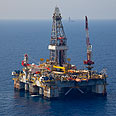
Leviathan gas field may cost at least $4.5B
Cost forecast is part of offshore well development plan US-Israeli consortium building natural gas field recently presented government with
The cost forecast was part of a development plan the consortium recently presented the government, the official said, speaking on condition of anonymity.
The group has said export options include building a liquefied natural gas(LNG) terminal, a pipeline to a neighboring country, or even bringing in a new technology known as a floating LNG vessel, which alone would cost $3 billion to $4 billion to construct.
Leviathan, discovered in 2010 with an estimated 19 trillion cubic feet (tcf) of natural gas, was the world's largest offshore discovery of the past decade.
A spokeswoman at Israel's Energy Ministry confirmed a development plan had been received, but provided no details. The Leviathan partners declined to comment.
The forecast came as Israel, long reliant on energy imports, struggles to find the balance between how much gas to keep and how much to export.
Awaiting export policy decision
At a fiery debate in parliament on Wednesday, exploration companies presented their case to set a high export quota, while a number of lawmakers and environmental groups demanded a large majority of Israel's reserves be kept for domestic use.
Texas-based Noble Energy, which leads the Leviathan group, has said that because Israel is such a small market, it could not commit to developing the field unless a significant amount of gas was allowed to be sold abroad.
A government committee recommended last year that Israel should keep enough gas to satisfy its own needs for 25 years, which comes out to a bit less than half of Israel's total reserves, currently estimated at 33.5 tcf.
But no final decision has been made.
Noble has a 39.66% stake in Leviathan. Israel's Avner Oil Exploration and Delek Drilling each have a 22.67% stake, and Ratio Oil Exploration holds the remaining 15%.
Australia's Woodside has agreed to purchase a 30% stake in the project, but officials say the deal can only be finalized after Israel determines its export policy.










